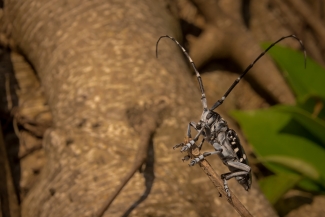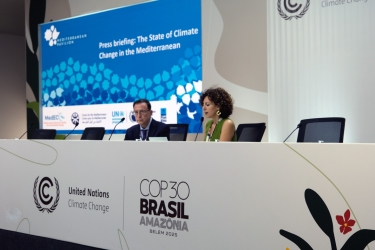New pest management project to combat economic losses in our forests

A new innovative project entitled The HOlistic Management of Emerging forest pests and Diseases (HOMED), launched in November 2018, will develop a series of cost-effective, environmentally friendly tools for the prevention, detection and control of invasive pests and pathogens threatening EU forests. In the last few decades, a growing list of introduced non-native pests and pathogens (PnPs) – linked to increasing global trade – have been causing dramatic losses to European trees and forests, which clearly provide numerous goods and services of benefit to people. HOMED aims to reduce the tremendous economic losses caused by invasive forest pests and pathogens.
Adopting a holistic and multi-actor approach, this 4-year project funded by EU H2020 – coordinated by the French National Institute for Agricultural Research (INRA) and in which EFIPLANT takes part – aims to develop a full panel of scientific knowledge and practical solutions for the management of emerging native and non-native pests and pathogens (PnPs) threatening European forests.
This initiative will improve strategies of risk assessment and management by targeting the successive phases of invasion (transport, introduction, establishment, spread), and developing mitigation methods for each phase, i.e. prevention, detection and diagnosis, surveillance, radiation and control tools. The most important aspect of this holistic approach is that it will not only focus on forests but address human activities (gardening, shipping, …) which can trigger the introduction of new/invasive biotic agents and their spread in and outside the forest.
What really makes HOMED so innovative?
Innovation is central, as new tools for pest management will benefit from the most advanced technology, e.g. electronic sensors, hyper spectral cameras, the latest satellite constellation, high-throughput sequencing, unmanned aerial vehicles and artificial intelligence. Given that it is impossible to foresee the next invasive or emerging pest or pathogen, the overall approach will be generic. However, the new tools will be tested on four main types of pests and pathogens, i.e. foliar moths and needle blights causing tree growth loss, wood boring beetles and dieback fungi causing tree mortality. By developing cost-effective, environmentally friendly tools for the prevention, detection and control, the project seeks to reduce the tremendous economic losses caused by invasive forest pests and pathogens and help to maintain the critical ecosystem services provided by EU forests, including climate change mitigation.
Last but not least, scientists will communicate with stakeholders throughout the project. Forest managers, biosecurity agencies, policy makers and environmental NGOs will be asked to express their needs and concerns and validate the tools as they develop. Twenty-one partners from main forested countries of EU or main regions of origin of invasive pests (e.g. North America, Australasia, China and South Africa) are involved in the project, including EFIPLANT.
How is EFIPLANT involved?
EFIPLANT is the leader of the project’s work package 1 ’Forest stakeholder’s engagement in emerging or invasive pests and pathogens risk assessment and management’. We shall provide our expertise in Mapping stakeholders and authorities involved in (ornamental) tree and forest biotic risk assessment and management in EU to identify their needs, build a social network dedicated to interactions with and between key stakeholders, and to develop an online toolbox for pest management.
Read more about the project here
Photo credits: rnfjansen, Flickr


